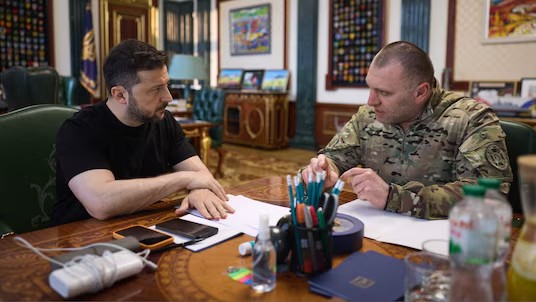A shadowy but methodical campaign dubbed Operation Spiderweb is emerging as one of Ukraine’s most effective military offensives to date, systematically crippling Russian air power through a string of precision strikes. Ukrainian forces have reportedly destroyed or severely damaged over 30 Russian aircraft in the last six weeks, many of them parked at airbases far from the front line, in what officials say is a calculated effort to reshape the aerial battlefield.
Sources within the Ukrainian Armed Forces describe the operation as a “coordinated decapitation of Russian air mobility,” aimed at neutralising Moscow’s advantage in the skies by eliminating assets before they can be deployed. Using a combination of long-range drones, saboteur teams, and Western-supplied precision weapons, Ukraine has managed to strike targets deep within Russian and occupied territories, including airfields in Crimea, Belgorod, Kursk, and even the Rostov region.



According to Ukrainian military intelligence, Operation Spiderweb has been in planning for months. The name is said to reference the network of Russian airbases across occupied territories and within the Russian Federation, which Ukrainian analysts have mapped with forensic precision. “We’re weaving a trap,” said one official, speaking anonymously. “One by one, each node of their air power is being cut away.”
Satellite imagery confirms at least seven major airfields hit since early April, with multiple Su-34 bombers, Mi-28 helicopters, and transport aircraft destroyed on the ground. Some of the attacks appear to have involved stealth drones launched from within Ukrainian territory, while others may have used intelligence provided by Western surveillance assets.
The campaign’s success has shaken confidence within Russian military circles. In several intercepted communications leaked by Ukrainian sources, Russian officers can be heard expressing frustration at the inability to defend fixed assets and the vulnerability of rear-area bases. The Kremlin has issued no official statement, though Russian state media has acknowledged “minor disruptions” at several airfields, stopping short of confirming losses.
Military analysts say the operation marks a strategic shift in Ukraine’s approach to the war, particularly in the face of a prolonged ground stalemate. “Ukraine has struggled to regain territory in recent months,” said Colonel Marta Kravchenko, a Kyiv-based defence analyst. “But what it’s doing now is degrading Russia’s ability to project force—striking at the lungs of their war machine.”
The impact has already been felt at the front. Ukrainian officials claim a noticeable reduction in Russian close air support sorties since the attacks began, particularly in the embattled Donetsk region. “We’ve seen fewer helicopters and bombers overhead, and our troops are moving more freely as a result,” said Colonel Oleksiy Hromov of the Ukrainian General Staff.
Western allies have praised the campaign’s ingenuity. A senior NATO official, speaking off the record, described Spiderweb as “a textbook case of asymmetric warfare,” noting that Ukraine is using minimal resources to deliver strategic disruption. Reports suggest that several of the long-range drones used in the strikes were Ukrainian-designed systems developed since the full-scale invasion began.
Still, risks remain. Russian retaliation has escalated in recent days, with new missile strikes on Ukrainian cities and infrastructure. There is also the danger of escalation beyond Ukraine’s borders, especially if Russian military planners interpret the strikes as being directly coordinated with Western powers.
Despite the hazards, Kyiv appears undeterred. President Volodymyr Zelensky has made no public mention of Operation Spiderweb, but in a recent address, he said Ukraine “will reach every source of Russian aggression, wherever it lies.”
As the war enters its third summer, Operation Spiderweb signals that Ukraine is refining its strategy—not just to hold ground, but to disarm its adversary at the roots. With each Russian aircraft destroyed on the tarmac, the balance of the war in the air shifts incrementally. It may yet prove to be one of Kyiv’s most decisive counterblows.
newshub finance



Recent Comments